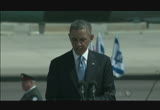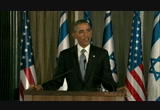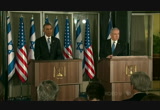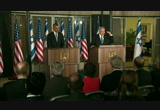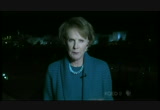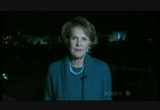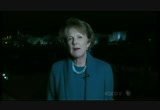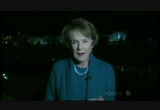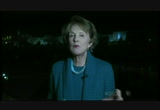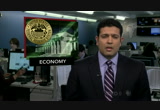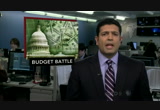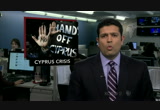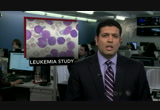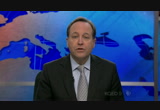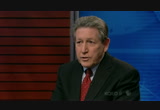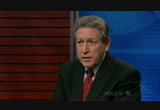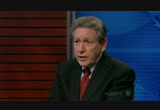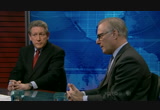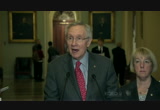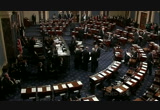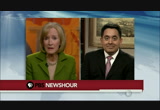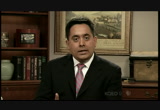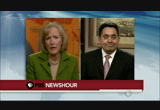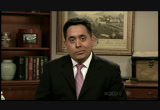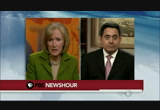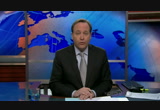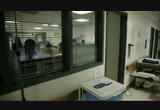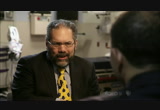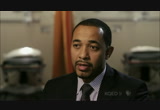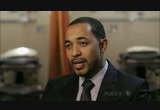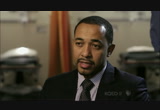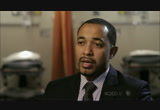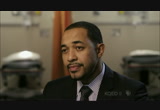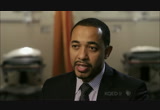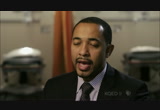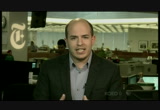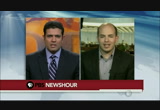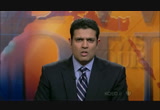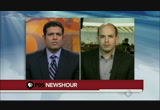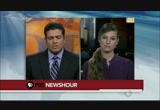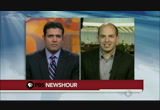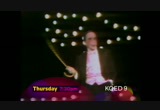tv PBS News Hour PBS March 20, 2013 6:00pm-7:00pm PDT
6:00 pm
trip of his second term, president obama today reassured israelis of his commitment to the nation and renewed warnings to iran and syria. we begin our coverage with a report from margaret warner who is on the ground there. >> warner: it was all sunshine and smiles as the president arrived on a sparkling day outside tel aviv. his tense, occasionally stormy relationship with prime minister netanyahu momentarily set aside as he began his first presidential visit to israel. >> good to see you. it's wonderful to be here. >> warner: the apparent goodwill led to a moment of levity about a deadly-serious issue that tops the agenda here-- the u.s. and israel's differing views on how to confront iran's advancing nuclear program, and what should be the trigger for military action against it. >> you hear about red lines all the time, right? >> bibi's always talking about redlines. this is all a psychological ploy! >> this was minutely planned! >> warner: netanyahu famously
6:01 pm
set his redline for action against iran's progress toward a bomb at the u.n. last fall. iran maintains its nuclear program is solely for peaceful energy production. as the arab uprisings convulse the president viewed a missile battery of the iron dome defense system-- heavily financed by the u.s., which knocked scores of rockets from the sky during brief november war with gaza. the president's remarks heavy with allusions to millenia of jewish history in the holy land and a nod to the broad purposes of his trip. >> across this region the winds of change bring both promise and peril. so i see this visit as an opportunity to reaffirm the unbreakable bonds between our nations, to restate america's unwavering commitment to israel's security, and to speak directly to the people of israel and to your neighbors. >> warner: he was referring to another focus of this visit: to listen to what israeli and
6:02 pm
palestinian leaders say they're willing to do to revive the stalled peace process between them. later at a press conference at the prime minister's jerusalem residence, the president was asked about yesterday's possible chemical weapons attack in northern syria. mr. obama said last year that if the regime used such weapons, it would cross a red line of its own. >> i've instructed my teams to work closely with all other countries in the region and international organizations and institutions to find out precisely whether or not this red line was crossed. i will note, without at this point having all the facts before me, that we know the syrian government has the capacity to carry out chemical weapon attacks. we know that there are those in the syrian government who have
6:03 pm
expressed a willingness to use chemical weapons if necessary to protect themselves. i am deeply skeptical of any claim that in fact it was the opposition that used chemical weapons. the broader point is, is that once we establish the facts, i have made clear that the use of chemical weapons is a game changer. >> warner: both leaders spoke extensively about iran and about the different timetables the countries are on for possible military action to prevent an iranian nuclear weapon. mr. obama said he thinks there is still time for diplomacy but added: >> each country has to make its own decisions when it comes to the awesome decision to engage in any kind of military action. and israel is differently situated than the united states, and i would not expect that the prime minister would make a decision about his country's
6:04 pm
security and defer that to any other country, any more than the united states would defer our decisions about what was important for our national security. >> warner: netanyahu was asked if he agreed wth mr obama's comment to israeli television last week that iran was over a year from having a nuclear weapon. >> if iran decides to go for a nuclear weapon, that is, to actually manufacture the weapon, then it probably, then it will take them about a year. i think that's correct. iran right now is enriching uranium. it will-- it's pursuing it. it hasn't yet reached the red line that i had described in my speech at the u.n. in any case, iran gets to an immunity zone when they get through the enrichment process, in our view... in our view. and whatever time is left, there's not a lot of time.
6:05 pm
>> warner: the president continues his trip tomorrow to the west bank to speak with palestinian leaders, then back to deliver a speech in jerusalem. >> ifill: i spoke with margaret a short while ago. margaret, it's good to see you. this is the president's first foreign visit of his second term. why israel, and why now? >> warner: that's a good question, gwen, because as i think we know from the campaign, president obama never did visit israel as president and got quite a bit of criticism and question about that. so the white house and the president decided this was the perfect time to come, to demonstrate-- the number one purpose of this trip was to demonstrate to the israeli public and prime minister netanyahi that the u.s. does have israel's interest at heart and as the president said himself today, that the u.s. has israel's back. and the reason that's important is because president obama needs to work together with president
6:06 pm
netanyahi on two particularly difficult issues. one is how to stop iran from getting a nuclear weapon, and the other is what to do about the fallout from the conflict in syria. in addition, the president would like to advance the wil rel-palestinian piece process, and again he needs prime minister netanyahi for that. above all, the white house and the president calculate that if he can move israeli public opinion about him from its deeply unfavorable view now-- only 10% in a poll last week have a favorable poll of the president. 38% think he's hostile to israel. if he can move that and have the israeli people trust him more it will be easier for netanyahi to cooperate with the president and harder for netanyahi to confront or oppose the president. >> ifill: netanyahi is forming his new government. the president is just starting his second term. they both had some domestic limitations on their minds, haven't they?
6:07 pm
>> warner: well, they have, gwen. the president and prime minister netanyahi both have had difficult situations at home politically as we know from the president and prime minister netanyahi as well here with all the different parties in his government. that said, his new government does not give him as much freedom to maneuver as he had last time. so there was a sort of funny remark at the end when prime minister netanyahi commented really on a question the president had been asked about why didn't you make much progress on the israeli-palestinian front in the first term or why didn't you work together, or word to that effect. and prime minister netanyahi said something like, "well, for this you need a second term as president and a third term as prime minister." and both of these men see for legacy building, again, if they can work together they can accomplish a lot more than having this head butting that
6:08 pm
they had at times in their-- in the president's first term. >> ifill: and it seemed today watching the two of them that they were getting along a little bit better. let me ask you about the first thing benjamin netanyahu said and the first question the president got. first was about iran and the first question the president got was about syria. these are two big looming questions, especially for israel, which they see, it seems, as a more immediate problem than often the u.s. has indicated. >> warner: i think with prime minister netanyahi and the president acknowledged that, it's almost-- i mean, it's much more in the neighborhood of iran. let's take iran first. but that it's really because of israel's less-developed military capabilities that if military action needs to be taken and the prime minister made clear today israel is not going to subcontract its security out to anyone, that it has a shorter window to act. that said, they also actually have a difference on when the point will come at which iran will be so far along with the
6:09 pm
number of cent rifortunatelies it has and enriched uranium, no one can stop it from getting a nuclear weapon. a moment will come in which iran can say we're leave the i.a.e.a., close the doors, and it would take three weeks. one, yes, there's a difference based on more vulnerability here in israel, but also they actually have a difference about how good even u.s. intelligence is to know when that moment comes for both of them. on syria, they're actually a lot closer. both-- neither one is calling for greater intervention right now. you don't hear netanyahi calling on the united states to get in there with troops. they both are deeply concerned about the chemical weapon. the president has said it's the use of chemical weapon he's most concerned about in the past. today he moved closer-- he embraced the prime minister's view, we are also deeply concerned or consider it a red line the transfer of nuclear
6:10 pm
weapons and that, of course, is what israel is worried about, right next door, if hezbollah, the sworn enemy in lebanon get these weapons there will be hell to pay for israel. >> ifill: margaret warner, thank you. >> brown: tomorrow, margaret will report on president obama's trip to the west bank and his meeting with president mahmoud abbas of the palestinian authority. still to come on the "newshour" tonight: after our look at the questions surrounding chemical weapons in syria; the state of play on gun control laws; life and death in the emergency room in newark, new jersey and high speed internet changing what we watch and how we watch it. but first, the other news of the day. here's hari sreenivasan. >> sreenivasan: the federal reserve stood by its aggressive plan to stimulate the u.s. economy, keeping short-term interest rates at record lows. and it said there are signs the economy is getting stronger. one of those signs-- unemployment-- fell to a four- year low of 7.7% in february. still, the fed predicted it won't reach 6.5% until 2015.
6:11 pm
the fed and its chairman, ben bernanke, also had words of caution for congress. >> i do believe that long-term fiscal stability is extremely important and i urge congress and the administration, as i always do when i go to testify, to do whatever is necessary to put us on a sustainable fiscal path going forward. but in doing so, i think it's a good idea to pay attention to the impacts in the near term on what is still not a completely satisfactory recovery. >> sreenivasan: congress moved a step closer to advancing a spending bill that would keep the federal government running through september. the senate passed the legislation this afternoon along bipartisan lines. the measure funds the day-to-day operating budgets of every cabinet agency, gives $87 billion to fund overseas military programs and keeps a pay freeze for federal workers. the house is expected to vote on the bill tomorrow. markets on wall street responded well to the fed statement. the dow jones industrial average gained nearly 56 points to close
6:12 pm
above 14,511. the nasdaq rose 25 points to close at 3,254. european markets rebounded today from a three-day losing streak, amid hopes cyprus will raise funds to qualify for a eurozone bailout. yesterday, the cypriot parliament rejected a bill to tax bank deposits. today, lawmakers crafted a plan "b." we have a report from jonathan rugman of "independent television news." >> reporter: why would the finance minister of a sun-kissedile be braving moscow's weather? because he's desperate for money. he came begging for around $5 billion euros and doesn't intend to leave without it. >> there were no offers, nothing concrete. we are continuing discussion. we are happy with a good beginning and looking forward to continuing this discussion over the next few hours. >> and while the cypriots have
6:13 pm
flown to russia, the russians have flown to cyprus. in a country where cash points still work, even if the banks behind them don't. these banks are not set to reopen until next tuesday. any dash for cash, and they could collapse. >> cyprus is facing on the economic side a question of survival. >> reporter: even the orthodox church has joined the scramble for a solution. the island's archbishop today told the president he would put the church's vast property portfolio up as collateral. yet, this is a government running out of time. and in the absence of an agreed financial life-line, possibly the first to leave the euro zone. >> sreenivasan: german chancellor angela merkel said today she is looking for a way to work with cyprus. the european central bank warned it would have to pull the plug on a bailout unless cyprus can make a quick decision. in south korea, a suspected cyberattack caused networks at major banks and top television broadcasters to crash
6:14 pm
simultaneously today. the attack paralyzed bank machines across the country. some were down for more than seven hours and customers couldn't use their debit and credit cards. there was no claim of responsibility and north korea made no comment about the attack. last week, the north accused the u.s. and south korea of a cyberattack that shut down its websites for two days. a new government estimate puts the number of schoolchildren with autism at one in 50. officials from the centers for disease control said this number relies on parents who report their child's disorder. the figure comes from a nationwide phone survey of 95,000 parents of children of all ages in 2011 and 2012. an earlier government estimate of one in 88 came from a study that used medical and school records. but it focused on 14 states and only on children who were eight years old. a deadly type of acute leukemia may have a chance at remission from cell therapy. the journal "science translational medicine" published the findings today. the treatment is experimental
6:15 pm
and has only been used on five adult patients whose bodies resisted chemotherapy. the treatment genetically alters a patient's own immune cells to fight the cancer. one patient saw all traces of his leukemia disappear within eight days of treatment. and three of the five patients have now been in remission for five to 24 months. general motors announced a recall of 27,000 vehicles because of problems with their automatic transmissions. the recall affects the 2013 models of buick's full-size lacrosse cars and cadillac's s.r.x. crossover s.u.v. g.m. cited a software problem that could cause the transmission to shift to sport mode and increase the risk of a crash, although none have been reported. those are some of the day's major stories. now, back to jeff. >> brown: and we continue our focus on the middle east with a deeper look at the question of chemical weapons and their possible use in syria. i'm joined by leonard spector, deputy director of the monterey institute's center for nonproliferation. and david ignatius, foreign
6:16 pm
affairs columnist for "the washington post." david, i want to start with you, and tell us what is known and not known about the possible use. what do we know about these incidents? >> yesterday, the free syrian army, the rebel military griewrng began tell u.s. officials they had reports of victims of two attacks in syria, one location in the north near aleppo. another location in damascus. and they began counting the numbers coming in to hospitals for. in the north the numbers were larger. they talked about 54 in the initial report, 14 of them dead on arrival. a smaller number in damascus. they added more detail today. i talked to the free syrian army officials i'm in contact with. the chairman of the house intelligence committee, mike rogers, senior u.s. official, has said publicly that he believes there is a high probability that there were chemical weapon attacks by the syrian government, as claimed by
6:17 pm
the rebels, and we now have president obama saying he is studying the information. it's not clear how those studies will be done since the sites are remote. >> brown: well, that's your question. how do we monitor these things? we have heard different things now. the israelis saying one thing, the ambassador ford, u.s. ambassador ford today saying there's no evidence so far. how does one monitor it? >> first, i think you want to observe the victims, see what they have experienced. there are still some that are alive and were brought to the hospital with wounds. so you'll have a chance to interview them if the hospitals are within a location where the syrian army can get to them, which is sounds like they are. and i imagine there are friendly countries in the area who have the opportunity to do those interviews. a lot would also depend on the kind of weapon that might have used to deliver the chemicals. if it was a scud missile, that sort of signals it's going to be the syrian government. if it's something like an
6:18 pm
artillery shell, it could be ambiguous. and of course the syrian government has called for an investigation with the neutral internal group. that suggests claire claiming nothing has happened. >> brown: when we say chemical weapon, what are we talking about? is there a range of things tho are more or less dangerous that would fall in that country? >> well, nerve gas. we know they have sarin, and we think they may have v.x. they're quite deadly. if you have a very small doarks as may have happened, you would have some very nasty symptoms but you might survive and that may be what we're observing. if it's mustard, it's blisters. i don't think any of the photographs we saw showed that. and most of the individuals we saw were on some kind of respirator, suggesting if something like this occurred, it may have been sarin. >> brown: so the president said the investigation is going on to see if they could confirm
6:19 pm
this. he talked again about the use of being a game changer, talked about that red line. what is going on behind the scenes in terms of preparation if it in fact turns out to have been chemical weapons? >> the obvious answer is we don't know. preparations are and have been secret. i should just note on the question of fact, my sources in the free syrian army say they believe the attack in the damascus area was sarin. and they're less sure about the other. and i have heard from u.s. government sources that they think it's possible that the casualties in these attacks might have been much greater if the weapons had performed as they were supposed to have. there was a problem, always, in disbursing chemical weapon agents. it's not so easy to descreminate them. it's thought the casualty toll might have been much larger. on your question of what the u.s. is going to do about it. only, the question for the president is who do you do when the red line that you've drawn
6:20 pm
is crossed, if you get the evidence to confirm that? we've been making military preparations to go in with u.s. allies, secure the chemical weapons stocks that are in syria to the extent that that's possible, but that's a big military operation. i would think the other thing that the u.s. is doing probably right now is talking to russia, which has also said use of chemical weapons in syria-- syria is an ally of russia-- is unacceptable. i would think that's the first stop is talk to the russians. >> brown: and this we talked about on this program before, just remind us. how large is this stockpile? how difficult would it be to go in and secure it? >> well, it's vast, because it was intended for military use against foreign troops. so typically that's, you know, hundreds, maybe thousands of tons of chemical agent disbursed at a number of sites, and these sites are still under syrian government control. so it's not as if we could arrive on the scene and they would say, yes, you may take these over and protect the sites.
6:21 pm
they may fight to hold on to them. so the options for us are not not so immediately obvious. one thing that will certainly happen is that if this was a chemical weapon attack, we will be going out to get as much evidence as we possibly can to make a convincing international case that time for action has come and convince the russians and others. >> brown: what about this question, the charge by the syrian government, that it was in fact the rebels. is anybody taking that seriously? >> i haven't heard anybody take it seriously. it's a somewhat implausible charge. there's no evidence the rebels have obtained access to chemical weapon stockpilepiles in syria. i think what this will do is push the debate about what the next step for the u.s. in syria is to a different level. >> brown: which had already been ramping up in some ways. >> that had been happening anyway. president obama has been deeply wary of making a military commitment in syria, but i think
6:22 pm
the pressure, for example, for some kind of safe haven in the north, in the areas that have been liberated by the syrian rebels with some kind of protection against air attack, i think there will be a growing push in that direction, already is in the administration. >> brown: you're agreeing with that? >> . >> would think so. also i think so we are going to have to provide some assistance for the victims. that will be another part of the operation if, indeed, this was a chemical weapon attack. >> brown: how does one do that? >> i think you probably want to get them on the of the country to hospitals where they can be treated more effectively, where there are no limitations on access to medical assistance and so forth. and, unfortunately, there is some experience in dealing with victims of these attacks, because of the iran-iraq war. so i would imagine the place would be probably jordan, possibly lebanon. >> brown: leonard spector and david ignatius, we'll keep watching, thanks very much. >> thank you. >> ifill: next, the latest on
6:23 pm
the battles playing out at both the federal and state levels to tighten gun laws. judy woodruff has our update. >> woodruff: for gun control supporters, today's signing ceremony in colorado spelled a significant victory in a western state where many people like their guns. governor john hickenlooper signed into law a series of measures requiring new background checks for private and online gun sales. the law also limits ammunition magazines to 15 rounds. but it was a bittersweet moment as well. before that ceremony, hickenlooper remembered his friend and the state's head of corrections, tom clements, who was shot and killed at his home yesterday evening. there are no known suspects. >> tom clements dedicated his life to being a public servant, to making our state better, to making the world a better place;
6:24 pm
and he is going to be deeply, deeply missed. >> woodruff: the passage of the new law comes eight months after the mass shooting in an aurora colorado movie theater. and it's the latest example of a larger battle playing out in state legislatures around the country. more than 3,000 pieces of gun- related legislation are being considered in statehouses. but even as momentum picks up in some states, a similar push on capitol hill has slowed. yesterday, senate majority leader harry reid acknowledged one bill-- an assault weapons ban crafted by california's dianne feinstein-- did not have enough support to move forward. >> but right now her amendment, using the most optimistic numbers, has less than 40 votes. i-- that's not 60. >> woodruff: a disappointed feinstein later said on cnn that she will not play dead on the issue, adding reid assured her she will have a chance to offer the ban as an amendment to a
6:25 pm
larger bill. >> if it's an amendment, that is not a symbolic vote. i did the bill in 1994 on the floor as an amendment. it enacted a law. it went on to the house. it was enacted. what senator reid told me is that i would have an opportunity for a vote. i take him at his word. >> woodruff: for now, reid and senate democrats are trying to find a way to get other measures passed. that includes an expansion of background checks, new penalties for gun trafficking and for so- called straw purchases-- when other individuals buy guns for those who aren't authorized to own them. reid is aiming for votes sometime after the easter recess. but there's still little-- if any-- republican support for that effort. for more, i am joined by ed o'keefe, who has been reporting on this subject for the "washington post." welcome back to the "newshour,"
6:26 pm
ed. first of all, majority leader reid said he was pulling the plug on this because it just didn't have enough votes. why has it been so hard to get the votes for the assault weapons ban? >> it basically boildz down down to campaign politics. you have 15 senate democrats up for reelection in 2014 and they hail mostly from states in the south and midwest and west that have stronger gun cultures than most, so asking those moderate democrats who are in state that have, you know, strong ghun cultures to vote for things on a ban on almost 160 specific assault rifles is a bridge too far for reid who understands in order to maintain his majority in the senate he has to see most if notal of those senators re-elected. already it is a difficult prospect, and it w be made more difficult, reid fears, if they were asked to vote on this. >> woodruff: when senator feinstein says reid has promised hear, in essence, he will let
6:27 pm
her introduce an amendment there, will be a vote on the amendment, what are the prospickets it's going to get any easier then? >> reporter: as reid said very specifically yesterday, quite astonish will, he said he doesn't think it has even 40 votes but it will fulfill a promise he made on behalf of the president to hold an up-or-down vote on this measure even if it doesn't have support. it has broad support in polling the "washington post" has done and pew has done and other groups but considering the breakdown of the senate where you need 60 votes in order to end debate on something and about that number-- well, you really need just about 50 for final passage but in order to get over the procedural hurdle in the senate you need 6015, maybe 20 are not comfortable voting for this and there certainly aren't enough republicans, either. >> woodruff: sopublic opinion polls don't translate into vote in the senate? >> in the weeks approaching,
6:28 pm
there is some hope if they can meet with lawmakers in the coming weeks and try to put some pressure on them and remind them they also vote perhaps you'll see some people come back from the recess in the mood to perhaps consider voting for this. >> woodruff: so how does the lobbying by groups that favor gun control, ed, stack up against the n.r.a., the parents of newtown, the mayor block berg organization and others? >> while the mayors' group is very well funded and backed by dozens of big-city mayors across the country and police chiefs who show up here on capitol hill regularly, what's less clear at this point, still, is whether they have the money and the political power behind them. we haven't had an election since newtown, so it's difficult to gauge. what bloomberg's group has said and these parent groups have said is come next year, if you're somebody who faces a
6:29 pm
difficult reelection and you didn't vote for this, we also now will put up money. we will put manpower in your district, in your state, to get you kicked out, much like the n.r.a. has done for years with lawmakers that vote one way or the other. i had a conversation with one activist this week who said in meetings that her group has had with bot both democrats and republicans, the lawmakers and staff have said great. great to see you. it's about time you showed up because when it comes to gundz the only group we hear from is the n.r.a. we don't hear from the other side. there has been very well-organized opposition to the status quo and the thinking is the personal stories of these parents who have been affected, the concerns of parents who don't want to see this happen again, plus the mayors, might turn the tide. >> woodruff: if the assault weapons ban say bridge too far, what about other pieces of legislation-- the background checks, the gun trafficking penalties and so forth? >> reporter: right, well, at
6:30 pm
this point the gun trafficking penalties is seen as one that has the most bipartisan support. it does a very simple thing. it basically makes the practice of someone knowingly buying a weapon for someone ineligible to have one a federal crime for the first time. this is something that has been asked for from law enforcement officials for years. it has republican support not only in the senate judiciary committee but believed also in the broader senate. the problem is you talk to police chiefs across the country and say we can't just have gun trafficking. we also need an expansion of the background check program. if you do that you essentially close the incentive for somebody to go out and make a straw purchase plus you make it easier for us to track gun crimes in the future. at this point, there's a democratic proposal to expand the background check programs that would encompass all private and commercial sales. that is seen as a bridge too far, again, for some republicans who say, look, there should be exemptions if, for example, a father wants to hand over or
6:31 pm
sell a rifle to his son or cousin or close neighbor across the street. there are talks under way in which that tiech exception might be permitted, but as part of those talks, democrats want to establish a recordkeeping systems for those private, noncommercial transaction, saying they also need to be tracked, just in case that weapon one day end up being used in a crime pment republicans say that's akin to creating a national gun registry that will violate the second amendment and we just can't do it. the hope is among those tracks this, there can be some kind of bipartisan consensus and something can be put together in time for votes after the recess. they've been talking for months and there have been no agreements. >> woodruff: just quickly, before we go, at the beginning of the segment we talked about what's going on in the states, colorado passed slairkz new york, and a number of other states looking at this, could the states end up moving more quickly than the congress? >> reporter: certainly. new york, for example, already
6:32 pm
established a much stronger assault weapons ban. and the fact that a purple state like colorado is encouraging to gun control spraingz you're seeing movement in illinois, new jersey, massachusetts, and california, the bigger urban states that suffer from this gun crime, most especially, but it's faltering in places like minnesota and washington state. yes, some states may get ahead of the federal government, but certainly not all of them. >> woodruff: ed o'keefe from the "washington post," thank you. >> great to be with you. >> ifill: online, you can watch kwame holman's conversation with a second amendment expert. find that on the special page devoted to our coverage of the gun debate at newshour.pbs.org. >> brown: next, an emergency room doctor returns to newark and grapples with pressing public health issues. ray suarez has our conversation. >> suarez: dr. sampson davis is the fifth of six children in his family. he was raised in downtown
6:33 pm
newark, new jersey in the 1970s. he was surrounded by crime, drugs, and murders and by the notorious high rise projects that earned newark its nickname-- brick city. many of those high rises have since been torn down. dozens of other buildings in the city's neighborhoods have been abandoned. newark remains one of the tougher urban areas in the country, with roughly a third of its residents living below the poverty line. the city's medical system also is under stress. >> i'm not ignoring you. it's just that it's been very busy, i haven't had a chance to. >> suarez: many residents lack access to primary care. the city's three remaining emergency rooms-- three others were shut down in the last decade-- are often packed to capacity with patients. after making a pact with two of his high school friends graduate medical school, dr. sampson davis returned to newark to work in the e.r. to try to make a difference. >> all right, let's go see a patient in fast track-- out towards the waiting room.
6:34 pm
>> suarez: the lessons he learned there and the stories of the people he met, are the subject of a new book "living and dying in brick city: an e.r. doctor returns home." >> we'd see about 100 patients or 125 patients a day. >> suarez: i spoke with him recently at st. michael's medical center in downtown newark, new jersey. dr. davis, welcome to the program. >> thank you, thank you for having me. >> suarez: the stories are gripping, memorable. the people you meet along the way are the kind of people who, i can see why they stick with you forever. but the thing that's unusual about the book is that along with these stories, there's all sorts of resources and diagnostic guides, and information digests, where to get help for certain kind of illnesses. it makes it an unusual book, really, in that way, the way it's structured. >> it was definitely a tough book to write, in the sense that i feel like it's part memoir, part self-help, part anecdotal,
6:35 pm
so i think it's a lot of different moving pieces that came together. but i feel like it sort of was important to tell the story of a person who had a certain ailment, versus talking about the ailment. because if you tell the story about the mother who's a nurse, who works in a hospital, who calls the ambulance because she's having some shortness of breath, and the ambulance isn't arriving in time, and now she's succumbing, and she's having difficulty breathing, her husband puts her in a car, drives her to the hospital, before she reaches the hospital, she succumbs and passes out. i rush out with a gurney, place her in a gurney, and we rush her back into the emergency department. she's full-term pregnant. we do a stat c-section, remove the baby, and then unfortunately we were unable to resuscitate her. so you have this person who is a part of the community, who's here to help the community, when she called the ambulance, the ambulance for whatever reason, it didn't show up in an expeditious way.
6:36 pm
so now at the end of that chapter, you talk about some of the signs and symptoms when you're having shortness of breath and what to do, but then you also get to the issue, the social issue at hand, we have an overflux of patients coming in to the emergency department, and if you're using the ambulance system for a non-emergency issue, you are taking away from that person who's not able to breathe. now imagine that was your grandmother, imagine that was your father, who's having trouble to breathe. >> suarez: reading your book reminded me, that living in the poorest neighborhoods in this country is not only unpleasant, but it's bad for you, can shorten your life. >> it absolutely can. i mean these stories, the collection of stories in this book really chronicle patients that i've seen throughout my career practicing emergency medicine. it's always issues around healthcare and access to healthcare in inner cities. >> suarez: access ends up being an enormous issue, because very sick people land in the e.r.s
6:37 pm
where you've worked, and its a lifetime of accumulated effects, and now you have to fix them. >> right. and fix them fast, in that split second. so i see patients come in who are suffering from heart attacks, obviously, who have strokes, but the strokes are a result of uncontrolled high blood pressure, who may be on dialysis, and that's an effect of uncontrolled diabetes and high blood pressure. i see trauma cases, gunshot-- young gunshot-- victims who prematurely lose their lives on the streets. i see cases of patients who don't have health insurance, and so they try to doctor themselves at home, and when all else fails, they just sort of finally give in and come in to the emergency department for treatment. on the other side of the spectrum, i'm also seeing mental illness, exacerbation of mental illness, depression, schizophrenia-- untreated, undiagnosed, where the patients have chronically suffered from these ailments and never seek treatment. society just sort of passed them
6:38 pm
by, and there's no outlet for them to sort of tap into so they can treat their depression or their illness that they're suffering from. >> suarez: that's a lot of the tension in the stories that you tell. as an emergency room doctor, you're seeing people in a fleeting, rather than longitudinal way, and your frustration comes through a lot, because you can't change their lives in one night together. >> right. and that's exactly the point. so to me, it's important to say, what can we do, what can be done. and to step outside the emergency part, to step outside the confines of my comfort zone, the hospital, and reach to the community and say, "hey, listen, you need to take your medications every day, you need to be a champion of your ailment." as a family, everyone needs to sort of bond together and help treat dad who may be suffering from cancer, or who hasn't gone for a precancerous screening. prevention is so key, and a lot
6:39 pm
of the patients unfortunately that i see, they don't go for the preventative care. by the time they're diagnosed, it's too late. and then the frustration comes through from my end, because i'm saying, i could have been, diagnosed you with the throat cancer, or told you to stop smoking, or been an advocate your healthcare and have the screening that you needed to sort of diagnose this early, you could have had treatment, and lived long enough to see your kids grow up and your grandchildren born, and see them thrive. there's sort of fear sometimes and apprehension when it comes to medicine, because of the lack of what a difficult to perceive and understanding what's going on with your body. and truly, it's not, once you invest that time and that energy, you can take better care of yourself than any physician or nurse practitioner or healthcare worker. >> suarez: but you can't fix some of the original causes of these illnesses. the malnutrition that's driven by poverty. the asthma that's made worse by life in an aging tenement home.
6:40 pm
there are causes that you know very well, since you grew up in newark, that can't be changed even by the best healthcare. it's too late by that time. >> i agree. and so the issue is multifaceted. it's not one sort of spot that you can sort of fix and change everything. but i think this is a start. i'm also advocating education, because i feel that if we educate ourselves, the more we educate ourselves, that we can overcome poverty. and the fact that if we do it as a community, and we stick together, we bond together, we support one another, with education, with health, then we can start to fix some of the issues at the root of the cause. and so we can erase, we can erase families who are struggling to get by on minimum wage. we can erase the drug abuse that we see on the streets and in the home. we can erase the gun violence and the domestic violence, and we can start to bring attention to mental illness. but this can only be done if
6:41 pm
everyone in the community is invested. so i think it has to be a position that we all take in which we say, yeah, take better care of yourself, yeah, go for your prescreening to make sure that you don't have any ailment that can be detrimental to you down the road. we also can then turn to our youth and our adults and say, "it's okay to get educated on these matters, it's okay to do well in school, for the young person that's in school. it's okay to achieve and be academically successful and show your academic excellence." sometimes in the inner city, especially amongst the adolescent peer group, there's some tension where it comes to you doing well in school. it's almost perceived as your being a nerd, or you're corny, you're trying to do better than everyone else. and so i want to erase that sort of issue and take away, and empower it, if they call you a nerd today for doing well in school, that's okay, because they'll be calling you boss tomorrow. >> suarez: the book is living and dying in brick city, dr. sampson davis, thanks a lot. >> thank you. >> ifill: online, dr. davis
6:42 pm
offers seven things young people can do to stay out of the emergency room. plus, he'll join us for a live web chat next week. you can submit questions on our health page. >> brown: finally tonight, the start of a series about the growing impact of broadband and the ways it's changing our habits, our work and our communities. high-speed access to the internet at home has risen steadily in recent years. studies show that some 66% of americans now have broadband connections. we begin with a focus on how all this is playing out in the entertainment industry. and again to hari who has the story. >> sreenivasan: traditional hollywood studios have long produced the movies and television we love to watch, but in the era of high-speed broadband, companies like netflix, amazon, youtube, and hulu are some of the new power players.
6:43 pm
all of them stream movies, tv and video. increasingly, they're creating their own unique content as well. for the moment, netflix has raised the stakes most prominently. last month it debuted all at once 13 episodes of its original $100 million series, "house of cards." it stars kevin spacey as a cynical u.s. house majority whip. its success turned up the heat on its competitor, amazon prime, which is spending millions on new content. amazon in turn announced an exclusive deal with pbs to stream its hit show, "downton abbey." cable providers like xfinity and time warner are making more of their content available online to their customers. according to comscore-- a company that tracks digital media-- every day, 75 million people in america watch videos online.
6:44 pm
we take a closer look at this now with brian selter who covers the space for the "new york times." and lisa donovan, a producer and co-founder of maker studios, an online video production company responsible for hundreds of millions of video view. thanks for joining us. brian, i want to start with you. if broadband is urbering a new era of what we would consider networks, how are these different? >> there are a couple of distinguishing factors about what netflix and amazon are producing and other companies could produce. these shows don't have to be a half hour or hour long. they can be various lengths. for the most part they tonight have advertising in the traditional sense. they could add advertising in the future but right now they don't have it. and they could also be on demand pretty much forever. they could be at the clickave button. they're not confined to a traditional television schedule. >> sreenivasan: lisa, you work with more than 10,000 producers. what are some of the advantages you have that traditional media,
6:45 pm
traditional networks don't? >> i think we're able to move very quickly. the producers, the content creators are really able to do and produce what they want without having to ask, you know, permission to do it. so if something happens in pop culture, they can make a videoed somely and get it out to their fan base. they're able to communicate directly with their audience and have a very, very engaged audience connection. and i think that's an advantage you don't get to see in mainstream international. >> sreenivasan: brian, on the business side of things you reported netflix is buying up shows without even having seen a pilot. in this land grab, explain to me what the return on investment is, or how they measure success when amazon and netflixs are buying so much content? >> it's pretty hard for to us measure success, particularly for netflix because they won't release ratings. for netflix this is about
6:46 pm
getting people not to unsubscribe. if they can hold on to their subscrieshz, that's a win. if they can convince new people to sign up because they heard about "house of cards" and "arrested development" that's a bigger win for netflix. that's true for amazon as well. they're in the business of keeping you subscribed to amazon prime. for youtube, the mod cell different. the youtube is only advertiser driven. it's not producing $100 million, $50 million shows. but it is seeding the environment with lots of little investments and over time, some of those can be subscriber services as well. you could imagine a future where some youtube channels are behind the subscription wall and they're going to be in the same business as netflix, trying to convince you it's worth paying a few dollars a month to watch their programming. >> sreenivasan: so, lisa, let's talk about the economics on that youtube platform. are the madison avenue advertisers convinced? do you have a predictable, steady revenue stream? >> i started on youtube in 2005
6:47 pm
before it was even monetized, so it's come such a long way. in 2007, i think, we became a partner and started monetizing and the c.p.m.s keep rising and i think that's the future, hopefully, is the ad dollars will move over to online and i think you're already starting to see that. and i think it's-- it's starring to become more and more predictable. i think i think we have a little ways to go before it's completely predictable, but we're getting there, and you're seeing a lot of content creators being able to make a living doing this and a very good living. >> sreenivasan: lisa, when you say "c.p.m."explain that briefly. are taeders expecting the same kind of hit as when i buy an advertisement on the super bowl. i know x-million people have watched it. >> it's different online. i think that's the thing, the value of the view online, i think that's what we need advertisers to really understand. i i obviously believe it's
6:48 pm
incredible valuable and as valuable as a tv ad, even more so because we're talking about people who are making videos with such an engaged audience that just love this person that is making the content, and that ad i think or if they're doing a brand integration i think is so incredibly valuable. i think over tiernlg advertisers are starting to really understand the value of that and hopefully, they'll be willing to pay as much as you would see on a network television show. and it's not there yet, but that is the goal is to hopefully have a lot of those ad dollars head over to online. as you see, things are merging. we see a lot of things, main stream, moving to online, and the connected tvs, and i think that's where it's headed. >> sreenivasan: brian, when you look at the cost of production here, for a standard tv episode, maybe $1 million, $2 million. for a small content creator that has their own youtube channel maybe they can make a show for $10,000, $15,000.
6:49 pm
do you see networks going out and scouring for this and making bets on smaller experiments? >> i to. i think of a spectrum where shows exist, and i think what we're seeing is a lot blurring happening where traditional television looks more like the web and the web can look more like traditional television. recently fox broadcasting took one of the youtube channels that its parent company invested in, called wigs, and brought it in house and will take some of the short youtube shows and start to turn them into television show, big, blockbuster television shows. that's an example of the cross-pollination i think we'll see more of going forward sphwhrar lisa, this is an odd question, are you seeing an aspirational shift? the goal used to be to get yourself on tv. are you seeing contrent creativitiors coming specifically to stay online? >> yeah, when we found maker, we wanted to be working with content creators who really
6:50 pm
didn't see it as a stepping stone but saw it more as a place to really find a home and really build an engaged, long-term audience. essentially they're building their own distribution, and that's a very powerful thing that we want the content creators to take very seriously. we work with a lot of people who do value what they're creating online. not that they won't be doing traditional thiks or can, but it's something where you don't want to give up on your audience, and you want to make sure you keep building that. and i think we're starting to see a lot of mainstream slebility or taenlt want to come online and start building their online presence. we signed ?oop dog last year, and that's been an exciting partnership glr are there snuff snoop doggs on the world that will make the networks take notice? >> i think there is. it's it's a great time to be an actor or producer or writer
6:51 pm
because there are more outlets. jeffrey tambour is on arrested development on netflix and a pilot program for amazon and he has more options than he used to have. it's not going to replace tv. tv is not going away, but it is going to add to tv and it's going to add up to a better experience for consumers, i think. >think. brian stelter from the "new york times," and lisa donovan, thank you. >> brown: hari's next report looks at the city with the fastest internet in the western hemisphere: chattanooga, tennessee. and we want to hear about your experience with broadband. join our open forum online on the rundown. >> ifill: again, the major developments of the day: president obama promised to work closely with israel and do whatever is needed to keep iran from getting nuclear weapons. the governor of colorado signed legislation expanding gun background checks and banning magazines that hold more than 15 rounds of ammunition. and the senate passed a huge spending bill to fund the government through the end of september, averting a government
6:52 pm
shutdown. online, we look at how one adventurer is preparing for an anniversary trek across antarctica. hari talks with joanne davies, who plans to lead an expedition on skis next year in honor of the 100th anniversary of explorer ernest shackleton's attempt. plus, health correspondent betty ann bowser examines the coming crisis in long-term care for seniors and shares her own experience with an ailing mother. that's on our health page. all that and more is on our website newshour.pbs.org. >> ifill: and that's the newshour for tonight. on thursday, we'll examine what congress is doing to keep the government up and running. i'm gwen ifill. >> brown: and i'm jeffrey brown. we'll see you online and again here tomorrow evening. thank you and good night. >> major funding for the pbs newshour has been provided by: ♪ ♪
6:53 pm
moving our economy for 160 years. bnsf, the engine that connects us. >> support also comes from carnegie corporation of new york, a foundation created to do what andrew carnegie called "real and permanent good." celebrating 100 years of philanthropy at carnegie.org. >> and with the ongoing support of these institutions and foundations. and... >> this program was made possible by the corporation for public broadcasting. and by contributions to your pbs station from viewers like you. thank you.
6:54 pm
6:58 pm
the federal reserve leaves interest rates where they are and stocks move higher. >> coming up, oracle and fed-ex, two corporates report disappointing earnings. >> and hot houses. more good news on housing sends home building stocks higher. we'll look at whether or not there's a thaw in the mortgage market as we continue our stream guide. all of that and more ahead. >> so, tyler, all about the federal reserve and the economy. >> and cyprus in there for good measure. it was a very busy news day. we're here to tell you all about it. the federal reserve did it again. says it's going to keep interest rates where they are, near 0%. and it also says it's going to keep up its bond-buying program. the markets like what they heard from the fed along with a pledge from the new head of japan central bank about its own bold, easing measures to be unvailed
6:59 pm
on thursday. as a result, stocks moved higher here about. the dow touching an all-time intraday high. the blue chips did close 56 higher. nasdaq up by 25 and the s&p 500 rose for the first time in four sessions adding 10 points and taking us to within a few of an all-time high. steve leaseman tells us where we go from here. >> the federal reserve voting 11 to 1 to keep its policy in place and purchasing $85 billion a month in treasury and mortgage-backed securities in an effort to drive down long-term interest rates. but the federal reserve chairman in the press conference after the statement came out, suggested that the fed may reduce the amount of monthly purchases if he sees sustained improvement. >> we are seeing improvement. i think one thing we would nee
181 Views
IN COLLECTIONS
KQED (PBS) Television Archive
Television Archive  Television Archive News Search Service
Television Archive News Search Service 
Uploaded by TV Archive on

 Live Music Archive
Live Music Archive Librivox Free Audio
Librivox Free Audio Metropolitan Museum
Metropolitan Museum Cleveland Museum of Art
Cleveland Museum of Art Internet Arcade
Internet Arcade Console Living Room
Console Living Room Books to Borrow
Books to Borrow Open Library
Open Library TV News
TV News Understanding 9/11
Understanding 9/11

